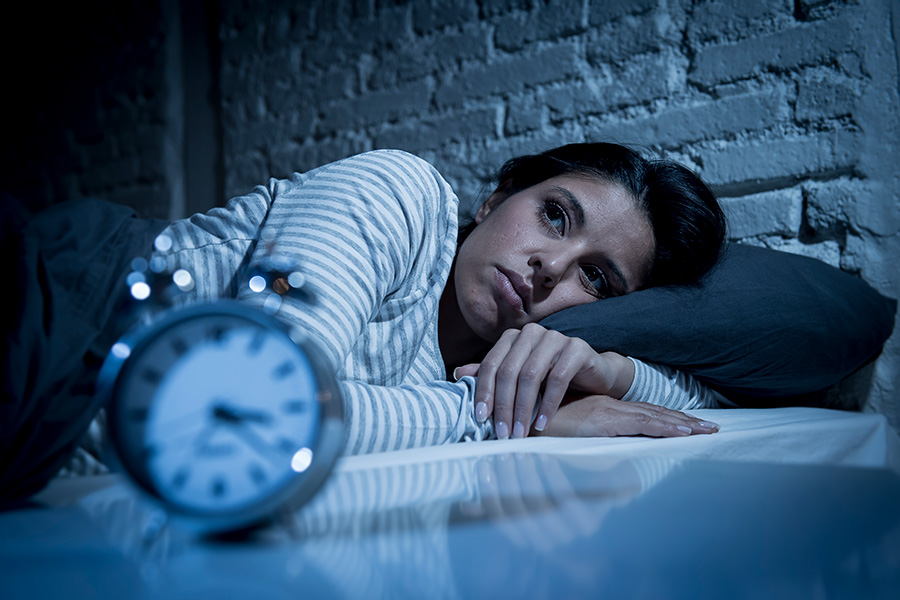What are the symptoms of sleep anxiety?
Sleep anxiety, or anxiety that specifically affects sleep, can manifest in several ways. Symptoms include:
- Difficulty Falling Asleep: Trouble initiating sleep due to racing thoughts or worry.
- Frequent Awakenings: Waking up multiple times during the night or very early in the morning and having difficulty falling back asleep.
- Restlessness: Feeling restless or uncomfortable while trying to sleep.
- Nightmares or Night Terrors: Experiencing distressing dreams or episodes of intense fear during sleep.
- Increased Heart Rate: Feeling a rapid or pounding heartbeat while trying to fall asleep.
- Sweating: Excessive sweating or feeling overheated during the night.
- Muscle Tension: Experiencing physical tension or tightness in the body.
- Ruminating Thoughts: Persistent worrying or overthinking that disrupts sleep.
- Daytime Fatigue: Feeling excessively tired or having difficulty functioning during the day due to poor sleep quality.
These symptoms can impact overall sleep quality and lead to increased daytime anxiety and stress. If sleep anxiety persists or significantly affects daily life, it may be helpful to seek guidance from a healthcare professional.
What are the causes of sleep anxiety?
Sleep anxiety can arise from various factors, including:
- Stress: High levels of stress from work, relationships, or other aspects of life can lead to anxiety that disrupts sleep.
- Worry and Overthinking: Persistent worrying about daily issues, future events, or personal problems can interfere with the ability to relax and fall asleep.
- Trauma or PTSD: Past traumatic experiences or ongoing PTSD can lead to heightened anxiety, including difficulties with sleep.
- Medical Conditions: Certain medical conditions like chronic pain, respiratory issues, or gastrointestinal problems can contribute to anxiety about sleep.
- Mental Health Disorders: Anxiety disorders, depression, and other mental health conditions often have symptoms that affect sleep.
- Poor Sleep Habits: Irregular sleep schedules, excessive screen time before bed, or an uncomfortable sleep environment can contribute to sleep anxiety.
- Caffeine and Stimulants: Consumption of caffeine or other stimulants, especially later in the day, can interfere with the ability to fall asleep.
- Medications: Some medications can have side effects that disrupt sleep or contribute to anxiety.
- Lifestyle Factors: Major life changes, such as moving to a new home or starting a new job, can trigger sleep anxiety.
Addressing these underlying causes through stress management, lifestyle adjustments, and professional support can help alleviate sleep anxiety.
What is the treatment for sleep anxiety?
Treating sleep anxiety involves a combination of lifestyle changes, behavioral therapies, and sometimes medications. Here are some common approaches:
- Cognitive Behavioral Therapy for Insomnia (CBT-I): This is a structured program that helps address thoughts and behaviors related to sleep anxiety. It often includes sleep education, cognitive restructuring, and behavioral techniques.
- Relaxation Techniques: Practices like deep breathing, progressive muscle relaxation, and mindfulness meditation can help reduce anxiety and improve sleep quality.
- Sleep Hygiene: Improving your sleep environment and habits can make a big difference. This includes maintaining a consistent sleep schedule, creating a relaxing bedtime routine, and ensuring your sleep environment is comfortable and free of distractions.
- Lifestyle Changes: Regular exercise, a balanced diet, and reducing caffeine and alcohol intake can help improve sleep. Also, avoiding screens before bedtime is important as blue light can interfere with sleep.
- Managing Stress: Addressing sources of stress in your life through therapy, stress management techniques, or lifestyle adjustments can help reduce overall anxiety, including sleep-related anxiety.
- Medication: In some cases, doctors might prescribe medication to help with sleep anxiety. This could include short-term use of sleep aids or medications to address underlying anxiety disorders.
- Professional Help: Consulting a mental health professional, such as a psychologist or psychiatrist, can be beneficial, especially if sleep anxiety is linked to an anxiety disorder or other mental health issues.
Combining these approaches often yields the best results, and it’s helpful to work with a healthcare provider to develop a personalized treatment plan.

Leave a Reply
You must be logged in to post a comment.